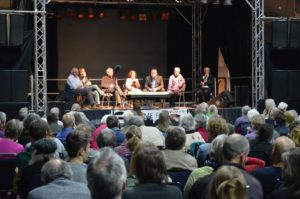 Frome Council in Somerset is working hard to be a different kinds of local authority, one that is more inclusive, participative and democratic. They call is ‘Flatpack Democracy’. Can what they do be done in much bigger local authorities?Here is a section from the new pamphlet ‘Towards a Deeper Democracy’
Frome Council in Somerset is working hard to be a different kinds of local authority, one that is more inclusive, participative and democratic. They call is ‘Flatpack Democracy’. Can what they do be done in much bigger local authorities?Here is a section from the new pamphlet ‘Towards a Deeper Democracy’
‘All 17 councillors are independent of political parties. They call themselves the ‘Independents from Frome’ (IfF). The group argue that party politics has no place in a town council because political parties are more concerned with point scoring and that such tribalism prevents open listening, dialogue and collaboration. The current system is effectively a form of ‘gatekeeping’ that discourages public participation in local decision-making processes. When the IfF was elected it spent time working on how they would work together as a group.
The ruling group developed its ideas on how to develop a devolved and inclusive system from a variety of sources including the radical and highly participative Spanish group Podemos and more recently the Danish Alternative Party.
When IfF took power it immediately changed the way council meetings were organised. Committed to narrowing the gap between local citizens and local politics and levelling a perceived hierarchy, they changed the language used in council minutes, documents and agendas; they also opened up all agenda items for public comment. They now hold some council meetings ‘in the round’ with members of the public.
The council has a key concept that everyone in Frome shares responsibility for resolving issues and taking things forward, ‘You can’t come to a meeting and demand ‘what are you going to do about some problem or other’, but rather what can we do together about the problem’.
Frome council organises regular public meetings around the open deliberation model developed by Podemos. These meetings are open but include experts on the issue. To avoid domination by a chair representing the council, skilled independent facilitators run the meeting. There is a commitment that whenever possible the council will adopt and implement the recommendation made at the meetings.
The council is also committed to planning and agreeing its budget through a participative budgeting process,” which means that locally elected councillors encourage and enable other local people to decide what the Council spends its money on. We make no apology to those who believe that councillors are elected to make decisions and they don’t need to work with the rest of the community to do so”.’
Is Frome an Example to Things to Come?
Frome Council in Somerset is working hard to be a different kinds of local authority, one that is more inclusive, participative and democratic. They call is 'Flatpack Democracy'. Can what they do be done in much bigger local authorities?
Colin Miller
Writer and campaigner for the creation of a more inclusive democratic system that enables citizens to be actively involved in the planning and decision making process.
His long experience in community development convinced him that there is a viable alternative to our existing failing democratic systems.
Creator of the deeperdemocracy.or.uk web site.